Celeste Ortega-Rodriguez (’15), a Ph.D. student in UNT's Graduate Research Training Initiative for Student Enhancement (G-RISE) program, discovered her love of research during her senior year at UNT.
She was working on her Honors College undergraduate thesis under the guidance of Mark Burleson, senior lecturer of biological sciences, and was serving as a research volunteer in the ecotoxicology lab led by Aaron Roberts, associate vice president for research and innovation and biological sciences professor.
“My undergraduate research experiences revealed a whole new world for me,” she says. “As neither of my parents graduated from college, and no one in my extended family had ever earned a graduate degree, I was unaware of science-related careers outside of health care. Aaron was the first person to encourage me to continue my journey with graduate school.”
After completing her master’s at Texas Christian University, she reconnected with Roberts and G-RISE, a UNT program funded by the U.S. National Institutes of Health to develop a diverse pool of scientists earning a Ph.D. through mentorship, financial support and career development resources. Roberts now serves as her faculty mentor in the program.
“Grad school can be really challenging for first-generation students,” Ortega-Rodriguez says. “Programs like G-RISE give students like me the opportunity to be successful. It does this by breaking down barriers that students may face, such as financial stress, lack of confidence or a lack of experience. Then, of course, G-RISE gives us a community and a place to belong.”
As one of only 22 Tier One research universities in the nation also designated a Hispanic-Serving Institution by the U.S. Department of Education, UNT is cultivating new opportunities for student researchers to gain the experience they need to launch their careers in a competitive market in Texas and beyond. And through investment in facilities, such as the forthcoming 111,000-square-foot Science and Technology Building, UNT is ensuring its researchers have modern spaces that promote innovative discovery, cross-training and collaboration across disciplines.
“There are many opportunities already in place, such as our summer research experiences for undergraduates and the research experience offered through our Honors College,” says Brenda Barrio, assistant vice president for research and innovation. “We also have more organic and intentional experiences through specific faculty or through our Institutes of Research Excellence. Our goal now is to expand the undergraduate research experience and bolster it from an interdisciplinary and holistic perspective to provide a springboard to graduate school.”
“As UNT’s impact as a higher education leader in the North Texas region continues to grow, we’re committed to finding new ways to spark our students’ curiosity and prepare them to become future leaders and innovators.”
-Pamela Padilla, UNT vice president for research and innovation
Barrio is partnering with divisions across the university to build a research infrastructure that supports students, faculty and staff through opportunities ranging from workshops and training programs to fellowships, internships, structured mentoring and more.
“Engaging students in meaningful and inclusive research early on not only improves their persistence and long- term success — it also helps them build skills and relationships that will benefit them well into their careers,” says Pamela Padilla, vice president for research and innovation. “As UNT’s impact as a higher education leader in the North Texas region continues to grow, we’re committed to finding new ways to spark our students’ curiosity and prepare them to become future leaders and innovators.”
Alumni Changemakers
Studies show that students who engage in research are twice as likely to graduate, five times more likely to go on to graduate school and have more successful careers after graduation. UNT alumni reflect on their time at UNT and the research opportunities they had as students that served as foundational jumpstarts toward their current careers.
From fashion entrepreneurship and data analysis to product development and wildlife conservation, UNT alums are using their research skills to serve as changemakers in a variety of industries.
 Kush Aggarwal (’23) is a brand technical seller for IBM, where he helps clients address challenges
and enhance their businesses’ value through data, artificial intelligence and information
architecture solutions. His education at UNT at Frisco equipped him well for his career
with courses in professional communication, project management, design thinking and
data analysis as part of the College of Applied and Collaborative Studies’ innovative
curriculum. After earning his degree, Aggarwal launched his career as regional technology
specialist trainee at Toyota Motor North America. While there, he participated in
the 2022 Global Swarm Hackathon, where he contributed to anti-drunk driving technology
that earned a patent, paving the way for Toyota to further develop the solution.
Kush Aggarwal (’23) is a brand technical seller for IBM, where he helps clients address challenges
and enhance their businesses’ value through data, artificial intelligence and information
architecture solutions. His education at UNT at Frisco equipped him well for his career
with courses in professional communication, project management, design thinking and
data analysis as part of the College of Applied and Collaborative Studies’ innovative
curriculum. After earning his degree, Aggarwal launched his career as regional technology
specialist trainee at Toyota Motor North America. While there, he participated in
the 2022 Global Swarm Hackathon, where he contributed to anti-drunk driving technology
that earned a patent, paving the way for Toyota to further develop the solution.
-Neil Foote
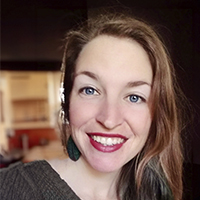 Jen Bailey (’13, ’16 M.S.) supports management of the National Environmental Policy Act (NEPA)
and the Natural Resource Program at NASA as functional management team lead at Herndon
Solutions Group, LLC. She has contributed to NEPA projects on space exploration and
produced reports on ecological corridors management and minimization of impacts to
extraterrestrial environments, as well as improved databases tracking natural resources
and environmental impacts across NASA. One of her first restorative projects came
as a student at UNT, where she learned science-based decision-making. She had the
idea to turn a few acres of Bermuda grass at UNT’s Discovery Park into the Pecan Creek
Pollinative Prairie. “Now, it serves as a refuge for wildlife, outdoor learning and
undergraduate research. I am proud to be part of building that,” she says.
Jen Bailey (’13, ’16 M.S.) supports management of the National Environmental Policy Act (NEPA)
and the Natural Resource Program at NASA as functional management team lead at Herndon
Solutions Group, LLC. She has contributed to NEPA projects on space exploration and
produced reports on ecological corridors management and minimization of impacts to
extraterrestrial environments, as well as improved databases tracking natural resources
and environmental impacts across NASA. One of her first restorative projects came
as a student at UNT, where she learned science-based decision-making. She had the
idea to turn a few acres of Bermuda grass at UNT’s Discovery Park into the Pecan Creek
Pollinative Prairie. “Now, it serves as a refuge for wildlife, outdoor learning and
undergraduate research. I am proud to be part of building that,” she says.
-Heather Noel
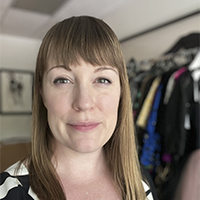 Annette Becker (’15 M.A.) cast a wide net when searching for graduate schools, but with her interest
in material culture, she knew UNT was for her. Mentors supported her in crafting presentations,
publishing a book chapter, interning at the Dallas Museum of Art and curating an exhibition
from UNT’s Texas Fashion Collection. Now the TFC’s full-time director and a doctoral
candidate in history, she says she still feels the impact of those experiences a decade
later. The TFC’s nearly 20,000 historic and designer fashions attract scholars, professionals
and institutions from around the world, including the Victoria and Albert Museum and
Metropolitan Museum of Art. Through research, programming and exhibitions, Becker
is making fashion and cultural history more accessible to everyone.
Annette Becker (’15 M.A.) cast a wide net when searching for graduate schools, but with her interest
in material culture, she knew UNT was for her. Mentors supported her in crafting presentations,
publishing a book chapter, interning at the Dallas Museum of Art and curating an exhibition
from UNT’s Texas Fashion Collection. Now the TFC’s full-time director and a doctoral
candidate in history, she says she still feels the impact of those experiences a decade
later. The TFC’s nearly 20,000 historic and designer fashions attract scholars, professionals
and institutions from around the world, including the Victoria and Albert Museum and
Metropolitan Museum of Art. Through research, programming and exhibitions, Becker
is making fashion and cultural history more accessible to everyone.
-Jill King
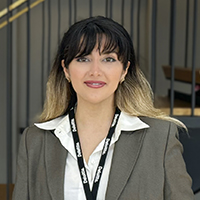 Sahar Behpour (’22 Ph.D.) provides clients with cutting-edge data and artificial intelligence solutions
as a data scientist consultant at Deloitte. For one current project, she is developing
a web-based data platform featuring interactive visualizations of cancer datasets
to support research for the National Cancer Institute. She says the role is deeply
rewarding, however when she first arrived at UNT and switched her major from physics
to data science, she was still navigating her place in the field. Then, after taking
a machine learning course everything fell into place. “The opportunities from my advisors
and the collaborative projects between different colleges at UNT were invaluable in
helping me grow and shaping the professional I am today,” Behpour says.
Sahar Behpour (’22 Ph.D.) provides clients with cutting-edge data and artificial intelligence solutions
as a data scientist consultant at Deloitte. For one current project, she is developing
a web-based data platform featuring interactive visualizations of cancer datasets
to support research for the National Cancer Institute. She says the role is deeply
rewarding, however when she first arrived at UNT and switched her major from physics
to data science, she was still navigating her place in the field. Then, after taking
a machine learning course everything fell into place. “The opportunities from my advisors
and the collaborative projects between different colleges at UNT were invaluable in
helping me grow and shaping the professional I am today,” Behpour says.
-Walker Smart
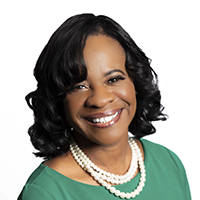 Laura Cobb Hayes (’86 M.Ed.) — who has decades of experience as an educator — is helping students
bridge the gap between high school and college as founder and CEO of The Learning
Bridge. Supported by a $1 million U.S. National Science Foundation grant, Hayes is
conducting research and developing an edtech video game called ADMITnGo, which will
provide an engaging way for students to learn how to prepare for college. The data
collection, analysis and interpretation skills she learned as a master’s student have
been invaluable in creating ADMITnGo. “At UNT, I honed my ability to solve complex
problems and think critically. These skills are essential for tackling challenges,
such as balancing educational content with entertainment, ensuring accessibility and
addressing potential technical limitations.”
Laura Cobb Hayes (’86 M.Ed.) — who has decades of experience as an educator — is helping students
bridge the gap between high school and college as founder and CEO of The Learning
Bridge. Supported by a $1 million U.S. National Science Foundation grant, Hayes is
conducting research and developing an edtech video game called ADMITnGo, which will
provide an engaging way for students to learn how to prepare for college. The data
collection, analysis and interpretation skills she learned as a master’s student have
been invaluable in creating ADMITnGo. “At UNT, I honed my ability to solve complex
problems and think critically. These skills are essential for tackling challenges,
such as balancing educational content with entertainment, ensuring accessibility and
addressing potential technical limitations.”
-Shelby Bahnick
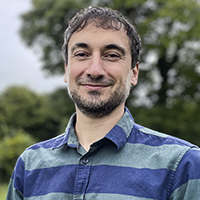 Ramiro Crego (’17 Ph.D.) says his time as a doctoral researcher with UNT’s Sub-Antarctic Biocultural
Conservation Program in Chile was “life changing,” giving him experience using research
methodologies, managing projects and introducing new perspectives of understanding
nature. Now a lecturer at the University College Cork in Ireland and a research associate
with the Smithsonian Conservation Biology Institute, Crego is still furthering research
he started at UNT, which included investigating the impacts of the American mink invasion
in Southern Chile and contributing to the discovery of a new bird species called the
Subantarctic Rayadito. Current projects — such as using advanced ecological models
and remotely-sensed products to aid giraffe and other large herbivore conservation
efforts across Africa — all center on wildlife conservation and spatial ecology.
Ramiro Crego (’17 Ph.D.) says his time as a doctoral researcher with UNT’s Sub-Antarctic Biocultural
Conservation Program in Chile was “life changing,” giving him experience using research
methodologies, managing projects and introducing new perspectives of understanding
nature. Now a lecturer at the University College Cork in Ireland and a research associate
with the Smithsonian Conservation Biology Institute, Crego is still furthering research
he started at UNT, which included investigating the impacts of the American mink invasion
in Southern Chile and contributing to the discovery of a new bird species called the
Subantarctic Rayadito. Current projects — such as using advanced ecological models
and remotely-sensed products to aid giraffe and other large herbivore conservation
efforts across Africa — all center on wildlife conservation and spatial ecology.
-Heather Noel
 Taylar Gomez (’18), entrepreneur in residence at Dallas venture capital firm RevTech Ventures,
began building her e-commerce startup SYFT while earning bachelor’s degrees in merchandising
and digital retailing at UNT. “My professors in the College of Merchandising, Hospitality
and Tourism provided the encouragement I needed to establish the company,” Gomez says.
Now, she’s hiring current UNT students to help analyze data collected by her company’s
browser extension. The SYFT plug-in uses artificial intelligence and algorithms she
developed to scour social media trends and analyze user preferences to create personalized
fashion options for its target audience of Gen Z shoppers. As online shoppers browse
their favorite sites, the SYFT plug-in curates personalized collections of clothing
items that are displayed in a pop-up window for purchase.
Taylar Gomez (’18), entrepreneur in residence at Dallas venture capital firm RevTech Ventures,
began building her e-commerce startup SYFT while earning bachelor’s degrees in merchandising
and digital retailing at UNT. “My professors in the College of Merchandising, Hospitality
and Tourism provided the encouragement I needed to establish the company,” Gomez says.
Now, she’s hiring current UNT students to help analyze data collected by her company’s
browser extension. The SYFT plug-in uses artificial intelligence and algorithms she
developed to scour social media trends and analyze user preferences to create personalized
fashion options for its target audience of Gen Z shoppers. As online shoppers browse
their favorite sites, the SYFT plug-in curates personalized collections of clothing
items that are displayed in a pop-up window for purchase.
-Lisa Sciortino
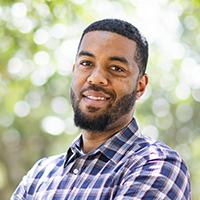 Adrian Harvey (’06, ’09 M.B.A.) helps businesses make better informed decisions with customers in
mind as senior vice president at the marketing insights company Buxton. Recognized
as a UNT Department of Information Technology and Decision Sciences Alumni of the
Year in 2014 and a G. Brint Ryan College of Business Rising Star in 2017, Harvey says
research he conducted at UNT using data and real-world scenarios prepared him for
his current role. “It was very beneficial in helping me in a professional setting
to make the translation between academia and real-world application.” He explained
that what may look good for a business on paper does not always translate. “Looking
at more than what the data says is important. You have to marry the art and the science.”
Adrian Harvey (’06, ’09 M.B.A.) helps businesses make better informed decisions with customers in
mind as senior vice president at the marketing insights company Buxton. Recognized
as a UNT Department of Information Technology and Decision Sciences Alumni of the
Year in 2014 and a G. Brint Ryan College of Business Rising Star in 2017, Harvey says
research he conducted at UNT using data and real-world scenarios prepared him for
his current role. “It was very beneficial in helping me in a professional setting
to make the translation between academia and real-world application.” He explained
that what may look good for a business on paper does not always translate. “Looking
at more than what the data says is important. You have to marry the art and the science.”
-Christiana Flores
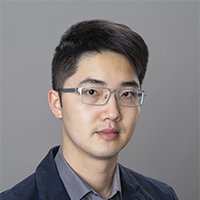 Shane Kuo (’20 Ph.D.) scales the company’s discoveries up from the lab to a commercially viable
product as a senior development scientist for Corning — a materials science technology
company in New York. It can be a complicated process, but Kuo’s time at UNT helping
professor Jincheng Du start his Functional Glasses and Materials Modeling Laboratory
taught Kuo to focus on the details. “As students, we started learning how to build
a lab,” Kuo says. “What instruments do we need? What kind of electric plug do we need?
There were lots of details and it was a big learning process. We didn’t know how to
do it but having that experience has actually proven very useful in my career.”
Shane Kuo (’20 Ph.D.) scales the company’s discoveries up from the lab to a commercially viable
product as a senior development scientist for Corning — a materials science technology
company in New York. It can be a complicated process, but Kuo’s time at UNT helping
professor Jincheng Du start his Functional Glasses and Materials Modeling Laboratory
taught Kuo to focus on the details. “As students, we started learning how to build
a lab,” Kuo says. “What instruments do we need? What kind of electric plug do we need?
There were lots of details and it was a big learning process. We didn’t know how to
do it but having that experience has actually proven very useful in my career.”
-Scott Brown
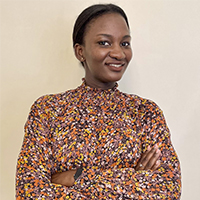 Yacine Ndiaye (’17) helps oversee research focused on African development challenges in areas like
finance, climate and health as a project manager for AfriCatalyst, a global development
advisory firm in Senegal. She says a UNT Honors College course with English professor
James Duban, in which she analyzed one work of literature, jumpstarted her current
career. Under Duban’s guidance, Ndiaye also applied for and earned the Rotary Global
Grant that paid for her master’s degree in global health at the University of Geneva.
“That UNT class introduced me to new perspectives and gave me tools for writing and
presenting my research,” Ndiaye says. “Those skills have carried me through getting
that scholarship, my master’s and now giving back through my work internationally.”
Yacine Ndiaye (’17) helps oversee research focused on African development challenges in areas like
finance, climate and health as a project manager for AfriCatalyst, a global development
advisory firm in Senegal. She says a UNT Honors College course with English professor
James Duban, in which she analyzed one work of literature, jumpstarted her current
career. Under Duban’s guidance, Ndiaye also applied for and earned the Rotary Global
Grant that paid for her master’s degree in global health at the University of Geneva.
“That UNT class introduced me to new perspectives and gave me tools for writing and
presenting my research,” Ndiaye says. “Those skills have carried me through getting
that scholarship, my master’s and now giving back through my work internationally.”
-Heather Noel
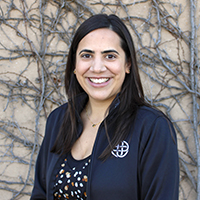 Solymar Rivera-Torres (’17 M.S., ’23 Ph.D.) is working to improve future generations’ health by erasing
the stigmas surrounding clinical trials as a bilingual research associate at the Institute
for Exercise and Environmental Medicine at Texas Health and UT Southwestern. Rivera
says UNT connections she made as a student have inspired her overall personal and
professional development, as well as encouraged her passion to educate Hispanic and
Latino communities about health studies. While at UNT, she contributed to opioid use
research being conducted by professors Stan Ingman and Elias Mpofu, which was funded
by the Health Resources and Services Administration. “This opportunity was a great
stepping stone to learn all aspects of research from study development to implementation
and evaluation,” she says.
Solymar Rivera-Torres (’17 M.S., ’23 Ph.D.) is working to improve future generations’ health by erasing
the stigmas surrounding clinical trials as a bilingual research associate at the Institute
for Exercise and Environmental Medicine at Texas Health and UT Southwestern. Rivera
says UNT connections she made as a student have inspired her overall personal and
professional development, as well as encouraged her passion to educate Hispanic and
Latino communities about health studies. While at UNT, she contributed to opioid use
research being conducted by professors Stan Ingman and Elias Mpofu, which was funded
by the Health Resources and Services Administration. “This opportunity was a great
stepping stone to learn all aspects of research from study development to implementation
and evaluation,” she says.
-Chelsey Gilbert
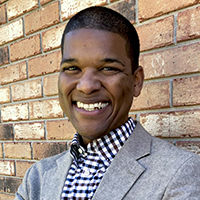 Justin West (’18 Ph.D.) is an assistant professor of music and human learning at the University
of Texas at Austin’s Butler School of Music. His research, which has been published
in a half-dozen peer-reviewed journals, is focused on professional development efforts
and outcomes for music educators — specifically, the vital role played by multi-day
professional conferences, which he attended while at UNT to gather qualitative data
for his Ph.D. dissertation. A former high school choir teacher, West — who was a Ronald
E. McNair Scholars Fellow at UNT — estimates more than 80 percent of music educators
attend such conferences annually. He says the events can be improved so teachers may
better implement lessons learned there upon returning to the classroom.
Justin West (’18 Ph.D.) is an assistant professor of music and human learning at the University
of Texas at Austin’s Butler School of Music. His research, which has been published
in a half-dozen peer-reviewed journals, is focused on professional development efforts
and outcomes for music educators — specifically, the vital role played by multi-day
professional conferences, which he attended while at UNT to gather qualitative data
for his Ph.D. dissertation. A former high school choir teacher, West — who was a Ronald
E. McNair Scholars Fellow at UNT — estimates more than 80 percent of music educators
attend such conferences annually. He says the events can be improved so teachers may
better implement lessons learned there upon returning to the classroom.
-Lisa Sciortino